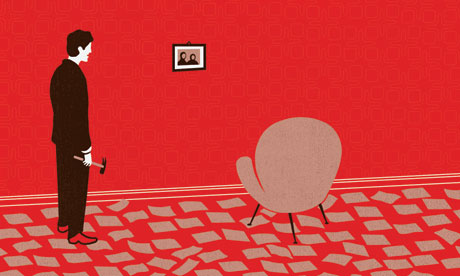
One of the things at which I'm especially bad is remembering to take photographs of family events, memorable evenings with friends, or holidays in extraordinary locales. I have a pretentious justification for this – about wanting to be present in the moment, rather than compulsively recording it – but the real reason may just be laziness. In an era of ubiquitous smartphones, I can often rely on someone else to take pictures, while impressive landscapes, I've concluded, are best left to professionals. (My photos of the Ngorongoro Crater in Tanzania made it look like a boring bit of the Brecon Beacons.) Not that I'm immune to the memorabilia-collecting urge. Since college, I've hauled from flat to flat an increasing number of boxes containing concert tickets, postcards, press passes and more. And I'm not entirely sure why.
The chief oddity about our enthusiasm for storing memories is that it seems so disproportionate to the time spent revisiting them. I've known people who try to capture everything, those who never bother and those who suddenly start doing so the moment they have children. But as far as I'm aware, none of my acquaintances, even the most elderly, spends significant parts of their lives poring over what they've collected. Which makes it hard for my inner Jean-Paul Sartre to resist the conclusion that collecting memories is less about the memories than the collecting: a desperate effort to slow down time, or shore up a barricade against the inevitable oblivion of death.
Professional decluttering types, when not trying to sell you "memory boxes" or leather-bound albums in which to store your memorabilia, advise a rigorous approach. "There is no need to act like a curator and keep every object from your past in a box as proof of your existence," counsels Erin Doland, in a recent post at Unclutterer.com. Consider photographing trinkets, then jettisoning the objects themselves.
A related torture is inherited furniture you hate. Jane Hammerslough, author of Dematerialising: Taming The Power Of Possessions, suggests checking on eBay just how cheaply you could buy a duplicate of that heirloom – a way to uproot the belief that in throwing out Mum's horrific floral armchair, you're really throwing out Mum. "Blood doesn't pump through veins in furniture or jewellery or tools or linens," Doland continues. "If you get rid of an object, you're not getting rid of the person who gave it to you, or the person you were when you acquired the item."
Maybe this is unfair, though. You could argue that carefully selecting which memories to preserve, whether by photographing or trinket-keeping, is a way not of evading the moment but of engaging with it more deeply. You can't open a magazine these days without being informed of the benefits of mindfulness, but Buddhist meditation has no monopoly on that: attentively composing a photograph might serve just as well. (Both photography and meditation, writes "Buddhist atheist" Stephen Batchelor, lead "away from fascination with the extraordinary and back to a rediscovery of the ordinary".) In which case, the promise of digital memorabilia – that we can archive every email and video-chat, even capture 24/7 footage – doesn't look so great after all. Not only because it would take for ever to sift through it all, but because the act of selecting is the point. You can choose to preserve memories or not. But you can't really outsource the job.
• oliver.burkeman@theguardian.com; twitter.com/oliverburkeman

